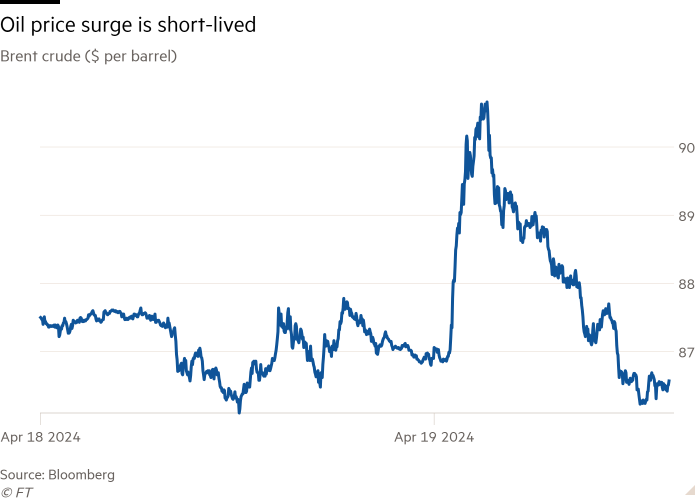
Unlock the Editor’s Digest for free
Roula Khalaf, Editor of the FT, selects her favourite stories in this weekly newsletter.
Oil markets shrugged off Israel’s retaliatory strikes against Iran after a shortlived price spike on Friday, in a sign of investors’ confidence that the action will not escalate into a broader conflict in the Middle East.
Brent crude, the international benchmark, was little changed on the day at $87.20 in late-afternoon trading, having jumped as high as $90.75 earlier in the session.
Prices retreated after Iranian state media played down the damage from the attacks. Oil is currently below the level seen before last week’s drone and missile attack on the Jewish state by Tehran.
Analysts said the reaction shows increasing confidence that both sides want to avoid a full-blown conflict that chokes off the supply of oil, while traders are also confident that diplomatic efforts led by the US — where President Joe Biden is keen to avoid a sharp rise in energy prices as he campaigns for re-election — will prevent the crisis from spiralling out of control.
“This is probably going a long way to convince the market that this situation is not going to fully blow up,” said Bjarne Schieldrop, chief commodities analyst at SEB. “The hope is that the retaliatory strikes will be fading in magnitude and then fizzle out.”

Traders are also relatively sanguine because Opec+ producers, which have been implementing voluntary cuts since 2022, will be ready to pump more crude in the event of an escalation that causes prices to jump towards $100.
Jorge Leon at Rystad, an energy research firm, said he calculated the underlying price for Brent crude should be $83 a barrel without the current premium for geopolitical risk that is baked into markets.
Prices had fallen earlier in the week following data showing US oil inventories were at their highest level since June, indicating markets would be amply supplied in the event of an escalation.
The short-term swings on Friday showed the markets were in an “agitated” state, said Viktor Katona, head of oil analysis at Kpler, an energy data and research company.
Some analysts have warned markets may nevertheless be underestimating the potential for an escalation that causes a disruption of supplies through the Strait of Hormuz.
Helima Croft, head of commodities research at RBC Capital Markets, said current oil prices were not an “accurate barometer” of the pressure building in the region.
“We continue to contend that the Middle East war risk points to escalation, not de-escalation at present,” she said in a note before the latest Israeli action against Iran. “We continue to see a direct threat to regional oil supplies in an expanded war scenario.”
